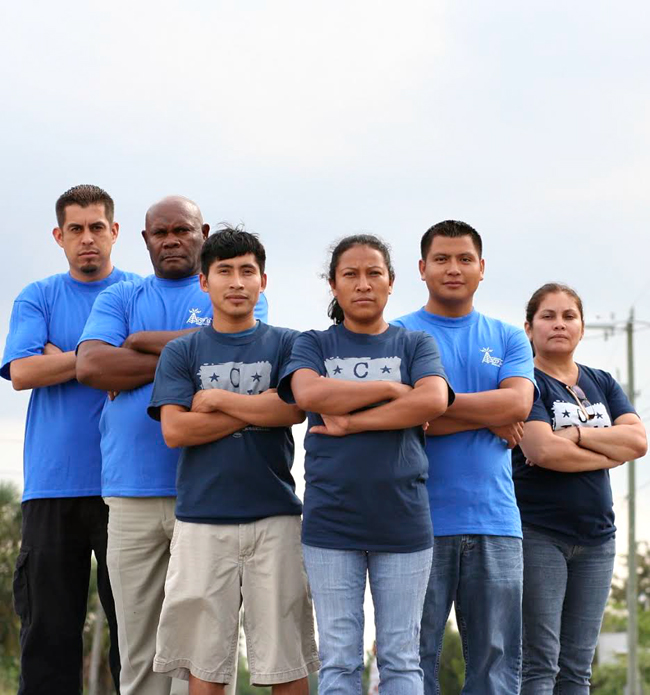Thirteen years ago in a Florida beach town, a small group of farmworkers from a dusty agricultural town a half-hour away filed out of their old van, hand-drawn signs in tow, to declare a national boycott of Taco Bell.
In a modern incarnation, David, fed up with injustice, had thrown the gauntlet against Goliath.
For decades, farmworkers in the U.S. have endured grinding poverty, powerlessness and violence, but these tomato-picking picketers were bent on transformation by building awareness of their plight and vision for change.
Their quest — to demand accountability for human rights abuses in the fields from multi-billion-dollar food retailers that profit more than anyone else in the chain of supply — perhaps seemed improbable.
But by forging alliances with consumers, the Coalition of Immokalee Workers built a movement that triggered dramatic change for tens of thousands of women and men toiling in our nation’s tomato fields.
UT students were among their earliest allies in the fledgling struggle. In November 2001, just months after the CIW quietly launched its campaign, several Longhorns met Immokalee farmworkers at a gathering in Georgia, bringing back to the 40 Acres a commitment to organize in solidarity.
Members of Campus Greens and Movimiento Estudiantil Chican@ de Atzlán began handing out flyers every Friday at the Taco Bell stores in the Texas Union and Dobie Mall, at times even donning bulbous tomato costumes.
Provocative posters, churned out of the Fine Arts school, graced electric boxes for miles around campus. A vibrant coalition of dozens of student groups and Greek organizations endorsed a call to “Boot the Bell” from campus.
In 2003, Student Government debated, but cowardly voted down, a resolution directing UT’s food-service provider Aramark to sever its contract with Taco Bell. Following this legislative defeat, the issue was taken in 2005 to the Texas Union Board, which also declined to take a stand. But weeks later, in March 2005, Taco Bell gave in to national pressure and joined farmworkers’ efforts.
(Years later, after the world’s four largest fast-food chains signed with CIW, Aramark found itself in student protest crosshairs, ultimately conceding in 2010.)
Today, 12 major buyers — from WalMart to Whole Foods, McDonald’s to Taco Bell — have joined the Fair Food Program, whereby they pay a tad extra for tomatoes, to boost farmworker pay, and condition their purchases on farms’ compliance with a worker-drafted, worker-monitored code of conduct.
The White House praised the Fair Food Program as among the nation’s “most successful and innovative programs” to combat human trafficking. Since the mid-1990s, the CIW had uncovered and helped prosecute seven brutal cases of forced labor, involving more than 1,000 farmworkers in the Southeast U.S.
Yet a front-page New York Times article in April described the tomato industry today, because of CIW’s achievements, as “probably the best working environment in American agriculture.”
In September, former President Bill Clinton selected CIW for his prestigious Global Initiative Award, lauding the group as “the most astonishing thing politically happening in the world we’re living in today.”
Inexplicably, however, Wendy’s has rejected CIW efforts. A nationwide student campaign dubbed “Boot the Braids” aims to overturn their resistance.
On Tuesday and Wednesday, CIW member Silvia Perez will be on campus giving classroom presentations. “My hope is UT students will join us in calling on Wendy’s to do the right thing by ending its refusal to join the Fair Food Program,” Perez told me.
Perez is in town for the Texas premiere of “Food Chains,” a penetrating film on the Immokalee farmworkers, whose producers include actress Eva Longoria and Eric Schlosser, author of “Fast Food Nation.”
The film will screen at The Marchesa on Wednesday at 7 p.m. and costs just $5 with a student ID. Mexican folk music from Son Armado precedes the film, with a panel afterward composed of Perez; Smriti Keshari, the film’s producer; and Tom Philpott, food correspondent for Mother Jones.
Truly, it is an honor to have CIW on the 40 Acres.
Lamentably, given their inexcusable refusal to join Fair Food efforts, the same cannot be said for Wendy’s.
Buckley is a Spanish and sociology alumnus who worked as a Daily Texan columnist during his time on the 40 Acres. He has lived in Immokalee, Florida, for seven years.





















